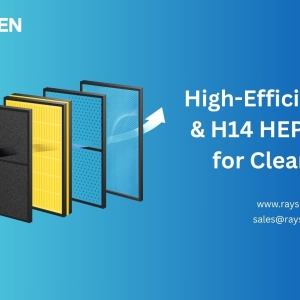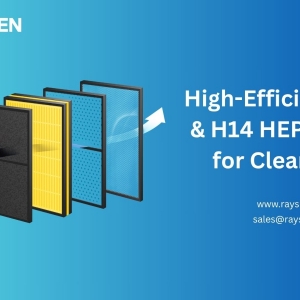Maintaining a controlled, contamination-free environment is essential in industries like pharmaceuticals, electronics, biotechnology, healthcare, and food processing. A clean room is only effective when it is supported by advanced and reliable clean room equipment. Brands like Rayshen specialize in engineering high-performance cleanroom systems that help companies maintain strict cleanliness standards and ensure product integrity.
This article explains what clean room equipment is, why it matters, and how essential components like HEPA filters, FFU, air shower, SS sink, and fan filter units work together to maintain high-grade contamination control.
Understanding Clean Room Equipment
Clean room equipment refers to all devices, machines, and systems designed to maintain a controlled environment with low levels of airborne particles, microbes, chemical vapors, and contaminants. Rayshen provides a wide range of clean room equipment that ensures:
- Consistent air filtration
- Particle-free work environments
- Proper material and personnel flow
- Sterile handwashing and gowning
- Controlled airflow and pressure
These systems are crucial for industries that must meet ISO, GMP, or FDA cleanroom standards.
HEPA Filter: The Heart of Air Filtration
One of the most important components in any clean room is the HEPA filter. HEPA (High-Efficiency Particulate Air) filters capture 99.97% of particles as small as 0.3 microns. These filters ensure that harmful contaminants like dust, microbes, and aerosols do not enter or circulate inside the controlled environment.
Rayshen manufactures high-quality HEPA filters, including H13 and H14 grades, which are essential for high-performance cleanrooms.
- H13 filters provide superior particle retention.
- H14 filters deliver ultra-fine filtration for critical operations.
Using the right hepa filter ensures a safe, sterile, and particle-free workspace.
Fan Filter Unit (FFU) – Creating Uniform Clean Air Flow
A fan filter unit (FFU) is another key element in contamination control. It combines a built-in fan with a HEPA or ULPA filter to draw air from the room, clean it, and recirculate purified air back into the cleanroom.
Rayshen’s FFUs offer benefits such as:
- Low energy consumption
- Uniform laminar airflow
- Quiet operation
- Long-life filtration performance
FFUs are typically installed in cleanroom ceilings and help maintain consistent positive pressure, ensuring contaminants stay out.
Air Shower – Removing Particles from Personnel & Materials
An air shower is a high-velocity airflow chamber placed at the entrance of a clean room. It uses powerful HEPA-filtered air jets to remove dust, lint, hair, and other particles from people or equipment before entering the controlled space.
Rayshen’s air showers help:
- Prevent contamination at entry points
- Protect sensitive processes
- Maintain ISO-classified environments
This makes them indispensable in pharmaceutical plants, semiconductor industries, and labs where hygiene is critical.
SS Sink – Maintaining Hygiene and Sanitization
Handwashing is one of the most crucial steps in cleanroom protocol. A high-quality SS sink (stainless steel sink) ensures proper sanitation for workers before entering the cleanroom.
Rayshen’s SS sinks offer:
- Easy-to-clean stainless steel surfaces
- Corrosion-resistant design
- Durability in high-use environments
Cleanrooms rely on SS sinks to maintain hygiene standards, reduce contamination risk, and support GMP compliance.
Fan Filter Units vs. Traditional Filtration Systems
Traditional HVAC systems alone cannot meet the air quality demands of a certified clean room. Fan filter units equipped with H13 or H14 HEPA filters provide targeted filtration at critical zones, ensuring that the cleanest possible air reaches the work area.
These systems:
- Reduce contamination risks
- Improve airflow distribution
- Allow modular cleanroom upgrades
- Support ISO Class 3–8 cleanroom environments
Brands like Rayshen supply high-performance fan filter units to meet diverse industrial needs.
How Clean Room Equipment Works Together for Contamination Control
Creating a contamination-controlled environment is a combined effort of multiple systems. Each piece of clean room equipment plays a crucial role:
- HEPA filters (H13 & H14) remove microscopic particles.
- FFU units circulate clean, filtered air.
- Air showers decontaminate people and materials before entry.
- SS sinks support hygiene and prevent biological contamination.
- Fan filter units maintain pressure and airflow consistency.
Together, these create a stable, sterile, and compliant cleanroom environment.
Why Clean Room Equipment Is Essential
Here’s why industries rely heavily on advanced clean room equipment from brands like Rayshen:
1. Product Quality
Contamination can ruin batches, damage electronics, or compromise medical products. Cleanroom tools prevent costly failures.
2. Safety
HEPA filters and airflow systems remove biological and chemical contaminants, improving worker safety.
3. Compliance
Regulated industries must meet strict cleanliness standards such as ISO, GMP, and FDA guidelines.
4. Operational Efficiency
Proper cleanroom equipment reduces downtime, maintenance costs, and environmental risks.
Conclusion
Clean rooms rely on sophisticated and reliable equipment to maintain contamination control, protect products, and ensure compliance. Components like the HEPA filter, H13/H14, FFU, air shower, SS sink, and fan filter unit work together to create a stable, particle-free environment.
With high-quality solutions from Rayshen, industries can achieve superior cleanliness, safety, and performance in every critical operation.








